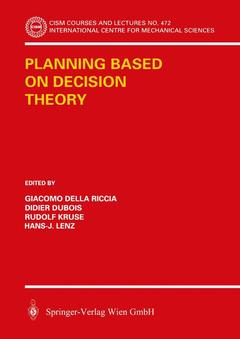Planning Based on Decision Theory, 2003 CISM International Centre for Mechanical Sciences Series, Vol. 472
Coordonnateurs : Della Riccia Giacomo, Kruse Rudolf, Dubois Didier, Lenz Hans-J.

Date de parution : 10-2003
Ouvrage de 165 p.
17x24.4 cm
Thèmes de Planning Based on Decision Theory :
Mots-clés :
Artificial Intelligence; Automation and Robotics; Computer Science; Mathematical Programming; Research; Robotices; Statistics; artificial intelligence; automation; computer; computer science; decision theory; learning; machine learning; operations research; optimization; programming; robot; robotics; software agents; statistics; uncertainty



